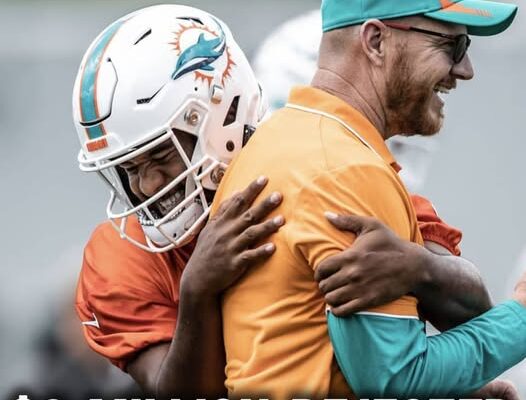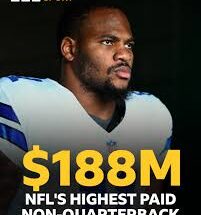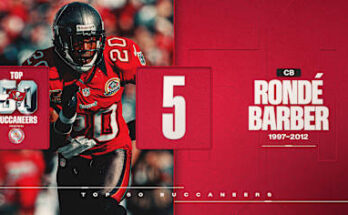Miami Dolphins quarterbacks coach and pass game coordinator Darrell Bevell has declined an astonishing \$2 million offer from the New England Patriots.
Darrell Bevell, the Miami Dolphins’ quarterbacks coach and pass game coordinator, recently made headlines when he turned down a remarkable \$2 million offer from the New England Patriots. This decision has sent ripples through the NFL community, raising questions about his motivations, the dynamics within both organizations, and the broader implications for coaching careers in professional football. To fully understand the significance of Bevell’s choice, it is important to explore his career trajectory, his role with the Dolphins, the Patriots’ interest, and what this decision could mean for the future of both teams and Bevell himself.
Darrell Bevell has been a respected figure in NFL coaching circles for many years. Known for his offensive acumen and ability to develop quarterbacks, Bevell’s career has spanned multiple teams and several high-profile roles. Before joining the Miami Dolphins, he was the offensive coordinator for the Seattle Seahawks, where he helped guide the team to a Super Bowl victory in 2013. His success there was largely attributed to his innovative approach to play-calling and his capacity to maximize the talents of quarterback Russell Wilson. Bevell’s reputation as a quarterback whisperer grew during this time, and many in the league viewed him as one of the top offensive minds.
In Miami, Bevell took on the dual role of quarterbacks coach and pass game coordinator, responsibilities that have become increasingly critical in today’s pass-heavy NFL. Under his guidance, the Dolphins’ passing game has shown significant improvement, contributing to the team’s overall offensive growth. The Dolphins have been eager to build a competitive team that can contend for playoff spots, and Bevell’s expertise has been a key component of that vision. His work developing young quarterbacks and designing efficient passing schemes has earned him respect from players and fellow coaches alike.
The offer from the New England Patriots, reportedly worth \$2 million, was jaw-dropping not only because of the financial terms but also because of the significance of the opportunity it represented. The Patriots have been one of the NFL’s most successful franchises over the past two decades, and joining their coaching staff would be seen as a major career milestone for many. New England has a history of fostering coaching talent and often uses their staff as a pipeline to head coaching positions elsewhere in the league. An offer from the Patriots is more than just a paycheck; it is a chance to work with one of the NFL’s most storied organizations and under the tutelage of Bill Belichick, one of the greatest coaches in the history of the sport.
However, Bevell’s decision to decline this lucrative offer indicates that factors beyond money and prestige are influencing his choices. One possible explanation is Bevell’s commitment to the Dolphins and the project they are building in Miami. The Dolphins have been steadily improving their roster, and the coaching staff has a close-knit culture that emphasizes collaboration and long-term development. Bevell may believe that staying with Miami offers a better path to success, whether that means competing for a championship or securing a future head coaching role. The stability and trust he has developed with the Dolphins’ organization and players could outweigh the allure of a new and potentially disruptive environment.
Additionally, Bevell’s personal and professional priorities likely played a role. Moving to a new team often involves significant upheaval, not just professionally but also personally. Family considerations, relocation challenges, and the desire for continuity can influence a coach’s decision to stay put, even when faced with a financially attractive offer. Bevell may have weighed these factors carefully and concluded that the benefits of remaining in Miami surpass the short-term gains of switching teams.
From the Dolphins’ perspective, retaining Bevell is a major win. Continuity in coaching, especially in the quarterback room and passing game, is crucial for sustained success. Quarterbacks thrive when they have consistency in coaching philosophy and communication. Bevell’s familiarity with the Dolphins’ roster and his ability to tailor the passing game to the strengths of his players make him an invaluable asset. Losing him to a rival team, particularly one with the stature of the Patriots, would have been a setback for Miami’s offensive development.
For the Patriots, Bevell’s refusal to join their staff means they must continue their search for a top-tier offensive mind to aid their rebuilding process. The Patriots are in a transitional phase, having recently moved on from long-time quarterback Tom Brady and now looking to establish a new identity. Bringing in a coach like Bevell could have helped accelerate that process, but with this door closing, they will need to explore other options. This situation underscores the challenges even successful franchises face in attracting coaching talent in a highly competitive market.
Bevell’s choice also speaks to a broader trend in the NFL coaching landscape, where loyalty, culture, and personal fit can outweigh financial incentives. Coaches today are increasingly selective about where they work, considering factors such as organizational stability, opportunities for advancement, and the overall environment. The NFL is known for its high turnover and pressure-cooker atmosphere, but some coaches are choosing to build long-term projects with teams where they feel valued and aligned with the vision. Bevell’s decision is an example of this shift, signaling that the allure of big-money offers does not automatically trump other considerations.
Moreover, Bevell’s move—or rather, his decision not to move—might influence other coaches in similar positions. It sets a precedent that turning down lucrative offers to maintain stability and work on long-term success projects is a valid and respected choice. This could encourage coaches to think more strategically about their career paths, weighing the pros and cons of switching teams beyond just salary and prestige.
Looking ahead, Bevell’s future with the Dolphins appears promising. His current role as quarterbacks coach and pass game coordinator positions him well for potential upward mobility within the organization. Should the Dolphins continue to improve offensively and compete at a higher level, Bevell’s stock as a coaching candidate for offensive coordinator or even head coach positions will rise. Staying in Miami allows him to build on his existing relationships and successes, enhancing his résumé with tangible team achievements.
The Dolphins, on their part, benefit from signaling to the rest of the league that they are serious about retaining key coaching talent and building a stable, competitive organization. By keeping Bevell, they send a message to players, fans, and potential hires that the team values continuity and is committed to a long-term vision. This could help Miami attract and retain both coaching and playing talent in the future, creating a virtuous cycle of growth.
Darrell Bevell’s decision to turn down a \$2 million offer from the New England Patriots is a multifaceted story about loyalty, career strategy, and the evolving nature of NFL coaching careers. While the offer itself was eye-catching, the factors that influenced Bevell’s refusal are rooted in deeper considerations about professional fulfillment, organizational fit, and personal priorities. His choice underscores the importance of stability and alignment in coaching decisions and highlights the competitive dynamics of NFL staffing in today’s game. For the Dolphins, retaining Bevell is a critical win in their quest for offensive excellence, while the Patriots must continue their search for the right coaching fit as they navigate a new era. For Bevell, this moment may well be a stepping stone to greater opportunities, built on the foundation of commitment and thoughtful career planning.



